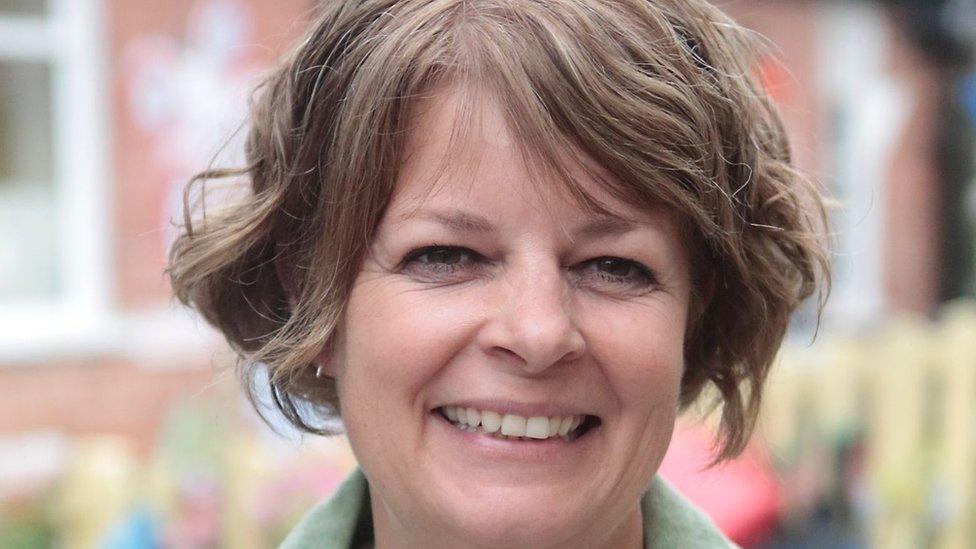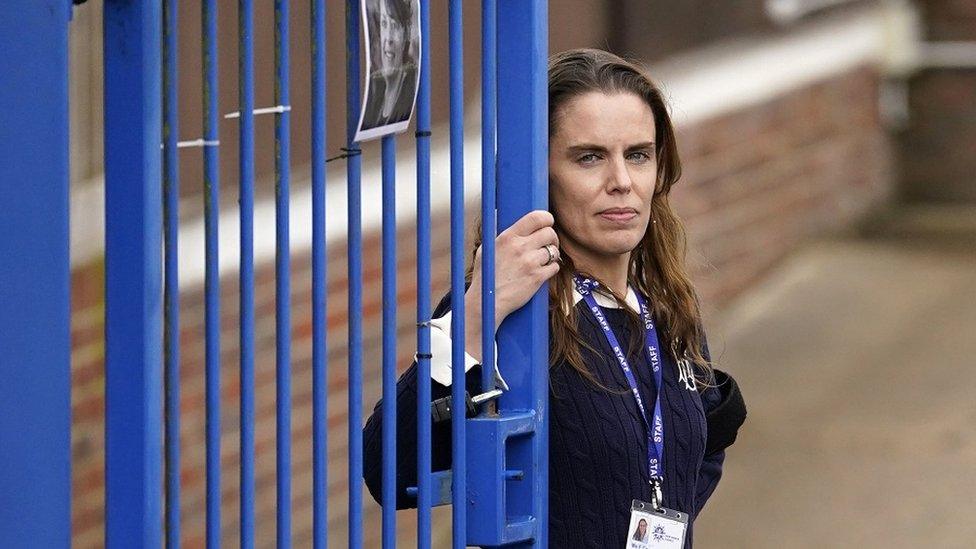Ofsted boss rejects calls to pause school inspections
- Published
Watch: Lisa Telling said Ruth knew her school's Ofsted result for 54 days but couldn't tell her staff
Stopping school inspections in England would be "against children's best interests", Ofsted's chief has said.
Teachers have called for them to be paused, after head teacher Ruth Perry took her own life while waiting for a report that downgraded her school from "outstanding" to "inadequate".
Amanda Spielman said inspections are important for both schools and parents.
It comes as the BBC can reveal Ms Perry had been "delighted" with feedback from Ofsted in an informal visit in 2019.
Inspectors had visited Caversham Primary School as part of a programme of informal visits to pilot a new inspection framework.
Ofsted has confirmed to the BBC's education editor Branwen Jeffreys that Ms Spielman attended in person to observe the visit.
In a newsletter to parents at the time, Ms Perry said she was "incredibly proud" of how well pupils and staff responded to the experience, adding that the feedback had been "overwhelmingly positive".
But after a formal inspection in November 2022, Ms Perry's school was rated as inadequate as a result of failings in training, record-keeping and checks on staff. The Ofsted report, external added that Caversham Primary School provided a good education and a welcoming and vibrant community for children.
Following Ms Perry's death, Ms Spielman has said a debate about reforming inspections to remove grades was a "legitimate one", but added that any changes to the system "would have to meet the needs both of parents and of government".
Ofsted inspectors give ratings of either outstanding, good, requires improvement or inadequate.
Ms Spielman said those ratings "give parents a simple and accessible summary of a school's strengths and weaknesses".
But Paul Gosling, president of the National Association of Head Teachers, told BBC Radio 4's Today programme the one-word assessments were too simplistic to sum up the complexity of school life.
Ms Perry's family has said her death was a "direct result of the pressure" caused by the school inspection.
Lisa Telling, a head teacher in Reading who knew Ms Perry well, said she had been under "enormous stress" and "knew the outcome of her report but was unable to tell her staff".
"As a head teacher, when you get your result and your final feedback, currently the system does not allow you to share that. That's a huge piece of information to hold on to," she said.
Ofsted's handbook, external says school leaders can share the provisional findings of inspections with those responsible for the governance of the school, as long as they are marked as confidential and subject to change.
Mrs Telling told BBC Breakfast that Ms Perry was restricted from sharing the "world-destroying" verdict for 54 days before she died.
Mr Gosling said school leaders should be allowed to speak to "a range of people who might be able to support them" if they were concerned by an Ofsted result.

Ruth Perry was the head at Caversham Primary School in Reading
Since Ms Perry's death, some head teachers have removed references to Ofsted from websites, job adverts and letters.
And on Thursday, the National Education Union handed a petition to the government calling for Ofsted to be replaced.
In Reading, headteachers' groups have written to the government asking for an urgent review of the system.
Ms Spielman said it would be wrong to say too much ahead of the coroner's inquest.
"Our school inspectors are all former or serving school leaders," she added. "They understand the vital work head teachers do and the pressures they are under."

Some head teachers, including Flora Cooper from Berkshire, are wearing black armbands during school inspections, following Ms Perry's suicide
Ms Spielman acknowledged inspections "can be challenging" but said inspectors always aimed to conduct them "with sensitivity as well as professionalism".
But school improvement adviser Julie Price-Grimshaw said that was "definitely not the case".
Speaking to BBC 5 Live Breakfast, she said many head teachers were getting "very ill, stressed and having breakdowns" as a result of inspections.
Ms Price-Grimshaw, who used to be an Ofsted inspector, said it was "impossible for teachers and head teachers to raise standards if they're feeling broken, demoralised, stressed and anxious".
But one vice-principal, at a secondary school in West Yorkshire, said Ofsted inspectors "came across as human and had collaborative conversations with staff", during a recent visit.
He said the inspection process was "intense and extremely stressful", but added that it resulted in an "honest reflection of where our school is at".
Ms Spielman said Ofsted aimed "to make inspections as collaborative and constructive as we can" and would remain focused on improving how it worked with schools, and "how inspections feel for school staff".
She admitted it was a difficult time to be a head teacher, particularly since the pandemic, as absence was high, mental health problems had increased and "external support services are unable to meet increased demand".

If you have been affected by issues raised in this article you can visit the BBC Action Line pages, or contact Samaritans, external.

A Department for Education official said Ofsted had a crucial role to play in upholding education standards and ensuring children were safe in school: "They provide independent, up-to-date evaluations on the quality of education, safeguarding and leadership, which parents greatly rely on to give them confidence in choosing the right school for their child."
A spokesman for the prime minister added: "We're confident the current rating system provides the right level of transparency for parents."
- Published21 March 2023
